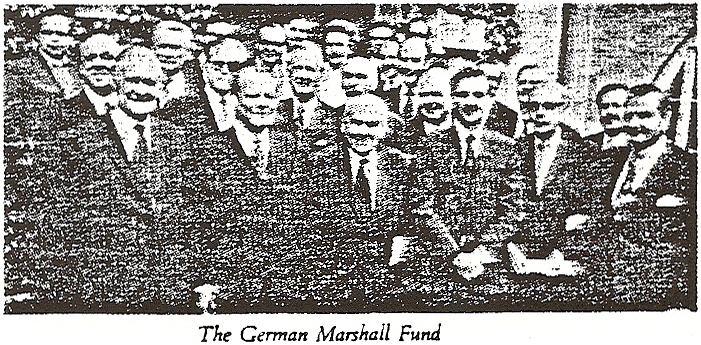The determinant institutions which are real force directing and controlling the staged “public outrage” at the policies of James Watt are the following:
-
THE CLUB OF
ROME
-
THE WORLD
WILDLIFE FUND
-
THE COUNCIL OF
FOREIGN RELATIONS
-
THE SOCIALIST
INTERNATIONAL
-
THE GERMAN
MARSHALL FUND
-
THE ASPEN
INSTITUTE FOR HUMANISTIC STUDIES
In the last two decades theses
associations, which have heavily overlapping memberships, have used different
guises and various ideological covers to call a halt to industrial,
technological and economic growth. The Club of Rome promotes the concept of
“limits to growth”; the Socialist International, using the United Nations and
World Bank as its vehicle, heralds “appropriate (i.e. backward):
technology”; the Council on Foreign
Relations preaches “controlled economic disintegration” (Paul Volcker’s
purposefully-implemented depression) and the Aspen Institute applauds
“humanistic not materialistic values”.
IN REALITY EVERY ONE OF THESE
ORGANIZATIONS IS COMMITED TO THE SAME POLICY: THE ESTABLISTMENT OF A MONOPOLIZED
CONTROL OF GLOBAL RESOURCES. RAW MATERIALS AND TECHNOLOGY BY A TINY ECONOMIC
ARISTOCRACY. It is independent production, invention and ownership – the basics
of the American System economy – that these institutions have deployed to crush.
They rightly perceived Jim Watt to present a big problem for
them.
The Foundation Center on West
57th Street in New York City has on file a record of transactions of
all foundations that operate in the United States, which is available for public
scrutiny. The source is called Comsearch
Printouts and the volume entitled: ENVIRONMENTAL PROGRAMS reports that in
the year 1980 alone, the Atlantic Richfield and combined Ford, Mellon and
Rockefeller Family Foundation interests contributed MORE THAN $18,000,000 TO
WORLD ENVIRONMENTALIST ORGANIZATIONS. That means that every significant
expenditure incurred in the training, media promotion, legal defense or any
other activity of the no-growthers was covered by this consortium of funds. The
very existence of the major environmentalist organizations depends to a large
extent on the monies deployed every year by ARCO, Ford, Mellon, Rockefeller and
related institutions.
WHAT IS REALLY
GOING ON HERE
A rancher from
Wyoming was golfing with a vice president of Mobil Oil recently and asked the
oil executive “Why do the multis bankroll the no-growth environmentalists?” A
bit on the defensive, the oil executive responded. “I guess you can’t lose if
you play both sides.”
Robert O. Anderson would certainly
be pleased by that kind of answer. After all, it took a lot of expense and
effort to set up the Aspen Institute. Maurice Guernier, Club of Rome policy
planner and one of the authors of Reshaping the International Order
(Report to the Club of Rome 1976), was a little more candid than the oil
executive in a recent conversation: “Our key to power is the ecology movement,
the environmentalist parties. The Club of Rome started these parties. The
ecology movements, these parties, are very useful to us because they go across
borders, because they encompass both the left and the right, and also the
middle. People don’t trust politicians, but they do trust the environmentalists.
If the ecology movement it well managed then you will see whole populations
beginning to change their minds on many things, and then the chiefs of state
will have to change their minds
too.”
 In 1949, Robert
Maynard Hutchins, then Chancellor of the University of Chicago (and soon to
become the first president of the re-organized Ford Foundation), along with
Guiseppe and Elisabeth Mann Borgese, initiated the founding of the Aspen
Institute. Hutchins’ personal education at Yale College and Yale University Law
School had provided him a comprehensive schooling in both the theory and
ideology of British global strategists like Cecil Rhodes, Lord Alfred Milner and
Halford Mackinder. Young Hutchins learned that while serving as director of the
London School Economics, Mackinder was the leading British economic theoretician
of the early 1900’s and that his “geopolitical” strategy was designed to
preserve secured looting rights for the British Empire through both resource
domination and suppression of technological innovation. Upon assuming the
presidency of the University of Chicago in 1929 (at the age of 29), Hutchins
translated his tutoring in British philosophy into university programs, which
under his direction, pioneered the creation of “liberal arts,” “humanities” and
“sociology” in the United States. Indicative of Hutchins’ radical bent was his
long-standing close association with Fabian socialist Bertrand
Russell.
In 1949, Robert
Maynard Hutchins, then Chancellor of the University of Chicago (and soon to
become the first president of the re-organized Ford Foundation), along with
Guiseppe and Elisabeth Mann Borgese, initiated the founding of the Aspen
Institute. Hutchins’ personal education at Yale College and Yale University Law
School had provided him a comprehensive schooling in both the theory and
ideology of British global strategists like Cecil Rhodes, Lord Alfred Milner and
Halford Mackinder. Young Hutchins learned that while serving as director of the
London School Economics, Mackinder was the leading British economic theoretician
of the early 1900’s and that his “geopolitical” strategy was designed to
preserve secured looting rights for the British Empire through both resource
domination and suppression of technological innovation. Upon assuming the
presidency of the University of Chicago in 1929 (at the age of 29), Hutchins
translated his tutoring in British philosophy into university programs, which
under his direction, pioneered the creation of “liberal arts,” “humanities” and
“sociology” in the United States. Indicative of Hutchins’ radical bent was his
long-standing close association with Fabian socialist Bertrand
Russell. During his tenure as president,
Hutchins provided a teaching position for Russell at the University of Chicago,
Russell used this podium to rally collaborators who would later work with him,
Hutchins and the Huxleys (Aldous and Julian) to launch the World Federalists.
The following is a quote from Russell’s 1962 book, Has a Man A Future? It pinpoints not
merely Russell’s outlook, but identifies the determining outlook of the
individuals that do not